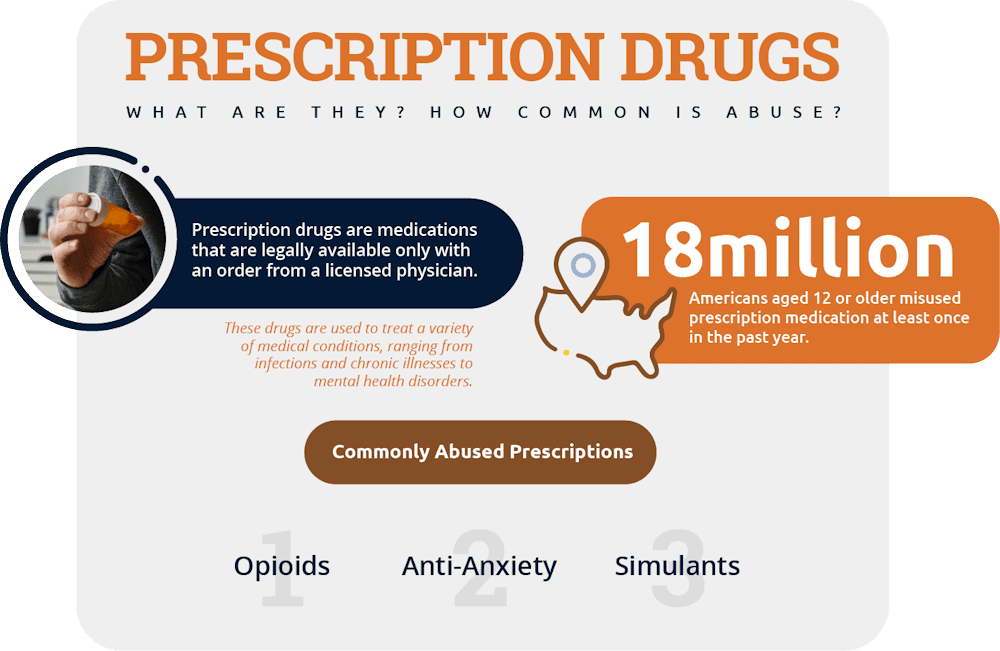Prescription Drugs Definition
Substance abuse disorders are common in the United States. Americans regularly abuse and misuse prescription drugs. In fact, 18 million Americans misuse prescription drugs annually. The prescription drugs definition isn’t complex: prescription medications include all substances that can legally be administered and prescribed by your doctor. Unfortunately, prescription drugs, like illicit substances, carry the risk of abuse and dependency.
The prescription drugs definition doesn’t explicitly explain that some medications are addictive. However, opioids like hydromorphone and oxycodone are highly addictive, even when taken exactly as prescribed.
What is the Prescription Drugs Definition?
 The prescription drugs definition applies to all medications licensed doctors and medical practitioners can prescribe to patients. While prescription drugs are highly effective in treating a variety of medical and mental health problems, they are still psychoactive and mind-altering substances. Since addiction doesn’t discriminate, meaning that anyone can develop a substance abuse disorder, prescription drugs carry the risk of leading to psychological and physical dependence.
The prescription drugs definition applies to all medications licensed doctors and medical practitioners can prescribe to patients. While prescription drugs are highly effective in treating a variety of medical and mental health problems, they are still psychoactive and mind-altering substances. Since addiction doesn’t discriminate, meaning that anyone can develop a substance abuse disorder, prescription drugs carry the risk of leading to psychological and physical dependence.
Some of the most commonly abused prescription drugs include:
- Vicodin, OxyContin, and Percocet
- Xanax and Klonopin
- Morphine
- Adderall and Ritalin
Physical dependency complicates the prescription drugs definition. Therefore, separating the prescription drugs definition from illicit substances becomes difficult. The addictive nature of many prescription drugs blurs the lines between medicine and recreationally abused drugs. When you develop a physical dependency, not only does your tolerance increase, which causes the effects of the substance to weaken over time, but you can also combat intense withdrawal symptoms when you stop using.
How is a Prescription Drug Addiction Treated?
Addiction is a mental health disease that causes major changes to your brain chemistry and pleasure and reward system. Your brain associates your substance of choice with pleasure because prescription medications and other psychoactive substances cause your brain to release a pleasurable rush of neurotransmitters. Your brain also associates everything that reminds you of your substance of choice with pleasure, which causes you to combat cravings when you’re exposed to triggers.
While addiction isn’t a curable condition, proper treatment allows you to fully recover. The earlier you receive treatment, the greater your chances are of making a full recovery. Treatment options can include both inpatient and outpatient programs, both offering options for evidence-based and holistic therapies.
During treatment, you’ll learn how to identify and cope with triggers and cravings. Finding healthy ways to deal with cravings ensures that you avoid relapsing. Substance abuse treatment programs can also help you navigate recovery and improve your communication skills. Finding ways to express troubling emotions can help reduce your likelihood of relapsing during recovery.
Finding Help Today
Now that you have a better understanding of prescription drugs definition, if you or a loved one is battling prescription drug addiction, reaching out for drug rehab in Northern Illinois is the first step in your recovery journey. Don’t let pills hold you back anymore. Free yourself from prescription drug addiction with Northern Illinois Recovery. Contact us online for admissions information. To find out more about our substance abuse treatment programs, call us today at 855.786.1978.




